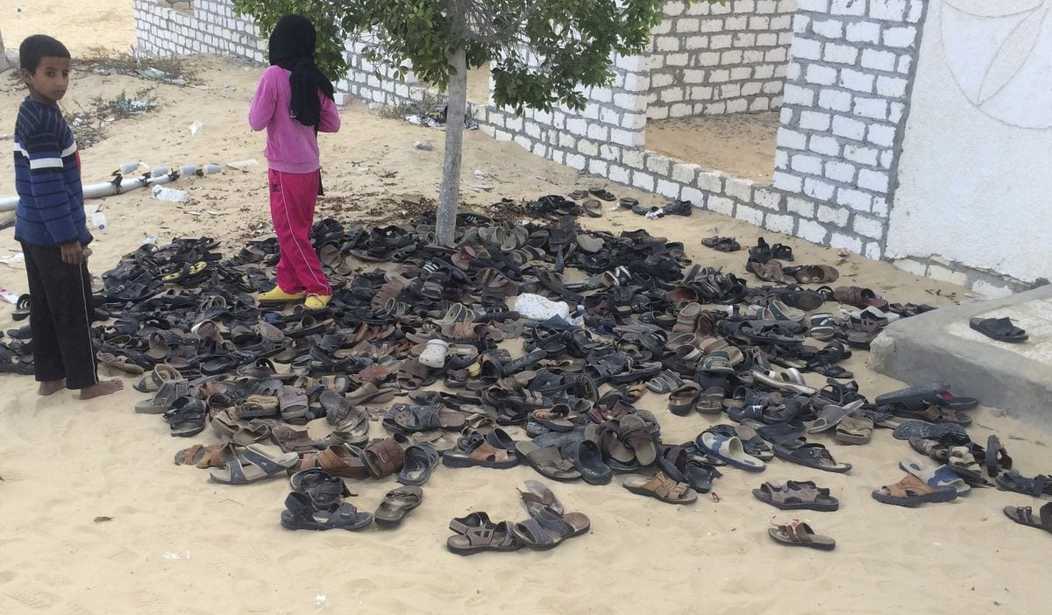The Egyptian military retaliated against what they say were terrorist targets in the Sinai after an attack on a mosque killed at least 305 people and wounded more than 100.
Authorities say 27 of the dead were children.
The Egyptian Air Force carried out several strikes based on intelligence from local law enforcement and the military.
The targets included weapons caches, the military officials said.
On Friday, the military said it had “chased down terrorist elements, discovered and destroyed a number of vehicles that carried out the terrorist attack, and killed those inside them in the vicinity of the attack in addition to targeting a number of terrorist outposts containing weapons and ammunitions.”
“The North Sinai law enforcement forces, in cooperation with the Air Force, continue to sweep terrorist strongholds and search for the rest of the Takfiri elements to eliminate them,” the statement added.
The attack on the al-Rawdah mosque Friday left at least 305 people dead including 27 children, officials. It also left more than 100 injured.
Some 25-35 militants brandishing ISIS flags carried out the attacks, prosecutors said.
Some were wearing masks and military-style uniforms and carrying black flags emblazoned with “There is no god but God. Muhammad is the messenger of God,” the prosecutor’s office said.
The Sinai is a sparsely populated area, inhabited mostly by Bedouin tribesmen. As Avi Issacharoff of the Times of Israel reports, there’s more going on in Sinai than meets the eye.
The pretext for Friday’s attack was likely the mosque’s affiliation with Islam’s mystical Sufi stream. It is known as the birthplace of Sheikh Eid al-Jariri, considered the founder of Sufism in the Sinai. The Islamic State, like al-Qaeda and other radical Sunni organizations before it, has denounced the Sufis.
But for IS it isn’t merely about religious differences: In the past two years, the Sufis have worked in tight cooperation with Egyptian security forces in the peninsula in an effort to counter the Islamic State and curb recruitment among the local Beduin.
Recent months have also seen a clan war that has pitted several tribes (notably Tarabin) against the Islamic State. The spate of mutual killings, which has included beheadings (not only on the part of IS), may also be connected to Friday’s attack. Last May, tribesmen executed eight Sinai Province operatives in retribution for a car bomb the terror group detonated near a Tarabin encampment.
Among the triggers for those incidents was Sinai Province’s effort to take control of smuggling along the border with the Gaza Strip and to stem the flow of cigarettes, which they forbid, into the Sinai. Those restrictions threatened the livelihood of the Tarabins, who responded with violence.
ISIS’s Sinai Province affiliate, formerly known as Ansar Bayt al-Maqdis, has no doubt been strengthened by an infusion of ISIS fighters who have recently been kicked out of Syria and Iraq. The fact that 25 to 35 fighters carried out the attack shows the problems facing Egypt’s military as they struggle to contain the terrorists.
But beyond IS cruelty and inter-tribal strife, what this attack drives home – and not for the first time – is the extent of the difficulty facing the Egyptian army in its efforts to counter the Islamist insurgency in the Sinai. Indeed, the frequency of attacks in mainland Egypt has gone down of late, and even within the Sinai the military has been able to operate relatively unmolested. Yet, Egyptian intelligence has come up against obvious difficulties in its effort to gain a real foothold in the peninsula, including amassing sufficient human and technological assets to clamp down on terrorism there.
In the immediate aftermath of Friday’s attack, Egyptian President Abdel-Fattah el-Sissi declared a new military onslaught against the perpetrators. Hours later, reports emerged of airstrikes against terror targets and dozens of dead among the insurgents. The question is what prevented Egypt from taking such action before the attack, and why previous efforts in the wake of earlier attacks did not yield significant gains.
Egypt has long refrained from embarking on an extensive operation, in the vein of the IDF’s Operation Defensive Shield in the West Bank and Gaza in 2002. Perhaps the cost of such a campaign would be prohibitive, or maybe it’s that as long as terrorism is more-or-less confined to the northeastern Sinai, Cairo doesn’t care as much.
The spin put on the retaliatory attacks by the Egyptian Air Force should not reassure the Egyptian people. A weapons cache here, a few terrorists there — that’s not progress. In effect, the Egyptian military is striking at shadows in the desert and there isn’t much they can do to effectively combat the Islamist threat.










Join the conversation as a VIP Member